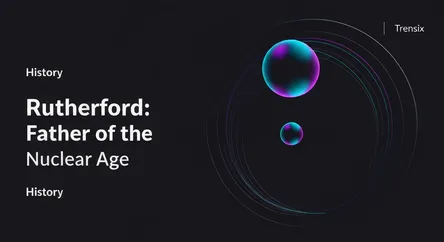History
Rutherford: Father of the Nuclear Age

An overview of Ernest Rutherford, the physicist whose discoveries reshaped our understanding of the atom and ushered in the nuclear age.
What is it?
Ernest Rutherford (1871-1937) was a New Zealand-born physicist who is considered the "father of nuclear physics." His groundbreaking work fundamentally changed our understanding of the atom. Through his famous gold foil experiment, he discovered that the atom is mostly empty space with a tiny, dense, positively-charged nucleus at its center. This led to his planetary model of the atom. Rutherford also identified and named alpha and beta radiation, discovered the concept of radioactive half-life, and was the first to artificially split the atom. In 1908, he was awarded the Nobel Prize in Chemistry for his investigations into radioactivity.
Why is it trending?
Rutherford's legacy remains central to modern science. His discovery of the atomic nucleus in 1911 was a revolutionary moment that paved the way for nuclear physics, quantum mechanics, and the development of nuclear energy and technologies. His work continues to be the foundation for numerous fields, and anniversaries of his key discoveries often bring his contributions back into focus. The principles he uncovered are essential for technologies ranging from medical imaging like PET scans to cancer radiotherapy, making his work perpetually relevant.
How does it affect people?
Rutherford's discoveries have had a profound and lasting impact on society. His research into atomic structure was the precursor to the development of both nuclear power, a significant source of global energy, and nuclear weapons, which have shaped geopolitics for decades. In medicine, the understanding of radioactivity that he pioneered is crucial for diagnostic techniques and cancer treatments. Furthermore, the entire field of modern electronics and material science is built upon the quantum mechanical model of the atom that succeeded his own, demonstrating the far-reaching consequences of his foundational work.